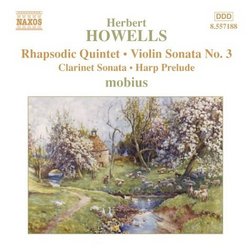| All Artists: Herbert Howells, Robert Plane, Mobius, Alison Nicholls, Sophia Rahman, Philippe Honore, Ashan Pillai Title: Herbert Howells: Chamber Music - Rhapsodic Quintet; Violin Sonata No. 3; Clarinet Sonata; Harp Prelude Members Wishing: 1 Total Copies: 0 Label: Naxos Original Release Date: 1/1/2004 Re-Release Date: 5/18/2004 Genre: Classical Styles: Chamber Music, Historical Periods, Classical (c.1770-1830), Instruments, Reeds & Winds Number of Discs: 1 SwapaCD Credits: 1 UPC: 747313218820 |
Search - Herbert Howells, Robert Plane, Mobius :: Herbert Howells: Chamber Music - Rhapsodic Quintet; Violin Sonata No. 3; Clarinet Sonata; Harp Prelude
 | Herbert Howells, Robert Plane, Mobius Herbert Howells: Chamber Music - Rhapsodic Quintet; Violin Sonata No. 3; Clarinet Sonata; Harp Prelude Genre: Classical
|
Larger Image |
CD Details |
CD ReviewsFine English Music J. M. Carter | CT | 03/20/2007 (5 out of 5 stars) "This CD is filled with chamber music by a special English composer who managed to incorporate modality and other early music aspects into his style (like VW and others). One needs an understanding of this style to take pleasure in it and a few listens to absorb all the musical effects. The 3+3+2 pulse at the beginning on the Clarinet sonata is hipnotic! This is GREAT music once you've gotten into it and composers like Howells, John Ireland, Gerald Finzi... all wrote well crafted music with a keen awareness of the instruments involved and are now growing in popularity and making it into the main repertoire. Well played performances from top British players." Far from top-drawer Howells, and the performances aren't per G.D. | Norway | 01/23/2010 (3 out of 5 stars) "Herbert Howells might be most famous for choral music and large-scale choral and orchestral settings, but his orchestral and chamber output have received an increasing amount of attention the last ten years or so. Stylistically he was certainly influenced by his teacher Stanford and by Vaughan Williams, yet his voice is a personal one - sometimes sounding a little like a cross between Brahms, Hindemith and Holst at the latter's most austere, but not without awareness of contemporary trends. Unfortunately the music on this disc doesn't show him in the best possible light.
The oldest work here is the short Prelude for harp from 1915; a fine, lyrical piece utilizing some interesting structural ideas (the ostinato accompaniment turning into its own theme is rather effective), but not a piece I think I'll ever return to. Vaughan Williams is a strong presence in the Rhapsodic Quintet from 1919. Inspiration isn't, however. It is formally speaking rather sophisticated, well constructed in what sounds like one long arch and with some interesting rhythmic transformation and a skillfully wrought development. The downside is that there is no material in there worth working with, and the whole work comes across as one of those where you only wait for it to do its thing and just come to a close. The third violin sonata from 1923 is the best work here; more dissonant and craggy than the earlier works, but still lyrical and pastoral and containing some very fine ideas. In two movements, it lacks a slow one, but includes much reflective and more subdued material in the two movements there are, so it isn't missed. The final movement is the strongest, building from a rambunctious opening not towards a climax but to quiet recollection of the opening - it is very effectively done, in fact. The clarinet sonata from 1946 is more ambitious but less interesting; some memorable use of cross-rhythms apart, there is little to engage the listener. The Near-Minuet from the same year is an inconsequential trifle. The performances aren't perfect either, although generally more than acceptable. Mobius is able to create some beautiful textures and the balance and interplay between the instruments is often impressive; but therein lies the problem, for these performances tend sometimes to lose sight of the utterly crucial overall structure of the music. On could also wish that some more sensitivity and poetry had been found as well when it comes to the solo sonatas. Furthermore, the recording isn't perfectly balanced, placing the piano far too far forward. Oh well, I should, in conclusion, point out that I did enjoy several things on this recording, but it is hardly one I will recommend without reservations. If you are already a Howells fan, I guess you can proceed with some confidence, but if not I would recommend that you went looking for some of the orchestral works (say the piano concertos) instead." |

 Track Listings (8) - Disc #1
Track Listings (8) - Disc #1